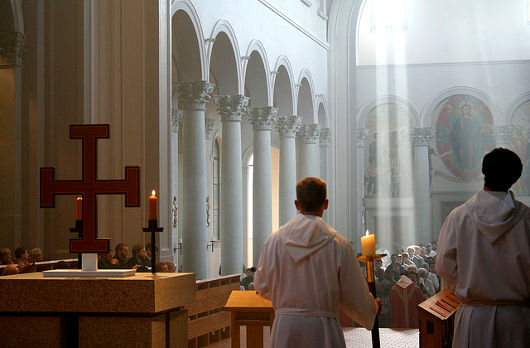Who are Today’s Secular Priests?
Picture: Daniel Kedlinger
From time to time I am going to post an excerpt from my work-in-progress book More Than This. Here is a snippet from chapter 2 – Guidance for the Path – on how we seek spiritual direction in a secular age. I look forward to your feedback in the comments section below.
***
A 21 year-old woman sits anxiously in a soft office chair, her eyes red from tears. Her father sits opposite, his hands clenched in his lap, and a 50-something man sits between them. ‘Is there anything you’d like to say to your father?’ the man asks in a gentle, caring tone. Christina takes a breath then looks her father in the eye.
‘Are you happy?’ she asks quietly.
‘Not totally,’ the father replies, his face a mixture of sadness and defiance. ‘I’m happier.’
‘You’re happier now than… when you were with me?’ She bites her lip, stifling tears.
‘That’s not what this is about, Chrissy…’
‘You said you were happier.’
‘I’m happier as a person. I’m certainly not happy about the distance between you and me. I never wanted that.’
Silence falls for a few moments, then the mediator probes further. ‘But that wasn’t her question,’ he says. ‘Her question was, in effect, if you’re happier living this way than you were as a father, a family man and as a best friend in her life.’
‘The only thing I’m happy about is my own true identity,’ the father replies. ‘I certainly miss the relationship Chrissy and I had. I’d love to have that back. But it’s more complicated than that.’ He looks at Christina. ‘I want you back in my life—there’s no question about it.’
‘What would it take to get you back?’ asks the man to Christina.
‘You’ve got to be my Dad,’ she says, staring at her father, ‘not this! My Dad is a man—he’s a role model and he’s there for his children.’
‘You have burned bridges, have you not?’ says the man to the father now, his words suddenly firm and bold. ‘Have you not said that the old you is gone and your daughter can’t have him back? You have basically said that because you want a change you won’t be Christina’s father anymore. That seems to me to be incredibly self-absorbed, incredibly one-sided and incredibly insensitive.’
Moments like this are expected in a pastor’s office, where both care and confrontation are needed to help a family find peace. In Christina’s case, however, the conversation is taking place in front of a TV audience with her father dressed in long hair, lipstick, a pretty blouse and skirt. The ‘pastor’ in this case is a talk show host teasing out the complexities of a gender reassignment story. After a website plug and a commercial break, the counselling-session-cum-talk-show is over.
Today’s Secular Priests
Whether on TV or radio, the talk show host has emerged as a modern-day priest. They are confessors to whom guests share their sins of adultery, drug abuse, compulsive eating and ‘mommy rage’. They are counsellors dolling out advice on phobias, depression, child-rearing and ‘love matches’. They are preachers delivering homilies on taxes, welfare cuts, injustice and ‘moral decline’. One sociologist has described such TV hosts as ‘revivalists’ who put sinners on stage, call them to repent, and offer conversion through the ‘religion’ of therapy. Christina’s father might well agree.
Some hosts recognise and cultivate this semi-religious status. ‘I’m very clear about what my role and purpose is,’ says the Queen of talk show hosts, Oprah Winfrey. ‘I am the messenger to deliver the message of redemption, of hope, of forgiveness, of gratitude, of evolving people to the best of themselves.’ Often described as the high priestess of religion-less spirituality, Oprah has been lauded as an oracle, a prophet, a spiritual leader and even a religion herself. On The Oprah Show she often resembled a preacher on a mission, spreading a ‘be all you can be’ gospel to an audience hungry for transformation. With god-like power she created other talk show hosts in her image. In saint-like fashion she blessed the work of many New Age authors. Oprah’s farewell show was described as a ‘sermon’. To her devout audience Oprah’s thoughts on life, love and fulfilment are tantamount to revelation. Oprah has been, and remains, a spiritual guide to millions.
We seek out other priestly voices too. Artists have long been hailed as spiritual guides. Poets like John Milton and William Blake, singers like Bob Dillan and Leonard Cohen, the cartoonist Michael Leunig and the graffiti artist Banksy have all been described as modern-day prophets.
And if the artist and talk show host can claim the mantle of secular priest, so must the writer—especially the memoirist, and especially the memoirist who documents their spiritual life…
***
Q: Who do you think are today’s secular ‘priests’? Who else do we look to to find guidance and wisdom for our lives?






Irenegleeson
I enjoyed the scene yr words painted, Sheridan. Very enlightening. What is the magic the TV host has that our church preachers lack?..But is this it ? Instead of preaching , should we do open counselling/ communications on the altar? Certainly the congregation would wake up & listen.
Of course yr Open House style opens ears & hearts to consider yr guidelines for change.
Sheridan Voysey
Good questions Irene. I’m not sure that any pastors should be imitating a talk show host (although I am a big believer in conversation as a communication tool).
You (kindly) mention Open House. It’s interesting – there have been times when I have felt like a confessor to some callers. They were telling me things they’d not shared to anyone else – while thousands of others listened in to the conversation too. What does that say?
What this says to me is that, religious, secular or whatever, we all have a longing for guidance and will seek it wherever we can find it. Those with the most attractive answers and platform will catch our attention. Whether what is shared is spiritually helpful… well…
Geoff W
Friends, psychologists and maybe bartenders are today’s secular priests. The people we confide in, take advice, and imbibe values from. Celebrities entertain. People who know us transform, play the priestly role. People close enough for us to be hurt by, are our real priests, secular or not.
The TV examples are familiar because they are popular, not necessarily profound. The main benefit of Dr Phil is for the people in the hot-seat. The rest of us watch for entertainment, then change channels with the ads. There’s no real profound change. Profound change in my life really only comes from face-to-face, being-to-being presence, when I can’t escape the “you-are-the-man.” TV has an influence insofar as to declare what values are popular. But then again I can “struggle” with whether what I am doing is popular, simply by changing to a channel that I like! I guess this leads me to doubt that celebrities are pied pipers (people agree with them because they are popular), but rather they are constructs (they’re popular because more people agree with them). – Interesting to watch the rise of Dicko’s popularity as his show’s values start left then keep sliding to the right as the populace shows a conservative value-set after all.
Anyhoo – other would-be-pied-pipers would have to include comedians (pumping values all the time) and any movie-makers, or TV show teams.
Sheridan Voysey
Great thoughts Geoff. On the celebrity issue you’d like Pete Ward’s book Gods Behaving Badly. He does a great job of revealing what’s going on there with celebs – us creating them, them shaping us – and the role they play as modern versions of the old Greek gods (who behaved, well, badly).
I think the TV folks can be largely entertainment for us as the viewer. However for many avid fans thay are transformative. Everything said by Dr Phil, Oprah etc is imbibed – tacitly, if not overtly.
I hadn’t thought of the bartender as a secular priest. A good addition. I’m reading a book by a British anthropologist about the Brits at the moment who makes the point that the English bar (not so much sitting down at the pub’s tables) is the one place strangers can engage others in conversation freely. The conversation doesn’t get too personal before someone gets squimish, but it is a place of sharing nonetheless.
Plenty of folks have poured out their soul to a bartender, especially after a few pints!
Rikki Lambert
Sheridan, congratulations on a well written article. You are quite right the talk show hosts, particularly Oprah and Dr Phil, are the oracles to whom housewives and the home-bound turn for counsel as life coaches, but they are not the only such guides.
In the modern secular priesthood, there are several such guides, prophets or whatever you would like to call them.
The outpouring of grief at the death of Steve Jobs is illustrative. Jobs is perceived, notwithstanding he did not deliver it singlehandedly, with delivering the iPod, iPhone and iPad – not to mention modern Apple computing – and with it a mobility of technology and the digital trappings we hold dear. The Jobs-like digirati are one modern day secular-spiritual leader, offering hope of a technologically enhanced future that offers connectivity, choice and freedom to be an individual – when those offers do not always necessarily come to fruition.
Authors, screenwriters, directors, producers, actors and musicians fall into this category too. Even those short of a film role but prominent in the social pages of women or men’s magazines are part of a modern day equivalent to the Greco-Roman pantheon of gods, goddesses, demigods and oracles who offer advice, inspiration, help and encouragement. Just look at the multi-million Twitter following of Lady Gaga, Justin Bieber, Ashton Kutcher and Demi Moore, Kim Kardashian etc. Then there are the ilk of Peter Jackson, Steven Spielberg, James Cameron and others who weave stories that inspire, challenge and tap into the spiritual reality that is either clear or mysterious to all.
Lastly, I believe the new global political icons are part of a modern secular priest-kings and queens. American Presidents tend to fill these roles, as do almost-Presidents like the eco-prophet Al Gore. I think Kevin Rudd fancied himself for this role once. The priest-king role is open to enigmatic UN Secretary-Generals or the rare member of the Hollywood pantheon who ascend to rule, for instance Bono or in a past life, Bob Geldof. These identities garner airtime with sympathetic ears to preach a worldview they would like to see adopted offering hope of a new one-humanity future.
The passion with which we see the digirati, the pantheon and the priest-kings supported by their backers indicates for the secular person absent a religious worldview, it is these individuals and idol-systems that they offer their worship, dedication and honour to.
Sheridan Voysey
Helpful thoughts Rikki. I’m glad you mentioned the technology thing. In many ways technology is considered to be a modern form of salvation (and those who bring it to us priests/prophets). I’m writing on that idea now.
Thanks for the thoughtful reflection.
Sue
I think peer evaluation has increased with social media. Ideas and thoughts, serious life issues and philosophical values are all aired on facebook, etc. The quality of feedback depends, not only on the quality of one’s ‘friends’ but their availability to respond. Busy people may not risk engaging in difficult and potentially time-consuming threads.
Who are the modern-day prophets? They are one-liners, quotes and misquotes, thoughts of the day, and those who bother to take the time to listen and respond.
Sheridan Voysey
Thanks Sue. I think the one-liners, quotes tacked up on walls etc are significant. In many ways they are modern creeds. More on that in a future post!
Drew
I am a Dr Phil fan – but difficult to see him in the UK where most people have never heard of him ! I don’t see his show as entertainment – I see most of the episodes as a time to assess what is really important. I see hairdressers as taking on some of the priest’s roles – some might say that hairdressers need a debriefing at the end of the day for they have many burdens places upon them.
Sheridan Voysey
A brilliant insight Drew. I remember hearing about a pharmaceutical company a few years back trying to find a way to engage women about their product for a more intimate concern. They enlisted haridressers as ‘reps’ for the product, as they were the one’s women often confided in. The same could well be true for non-physical concerns – like spiritual ones.